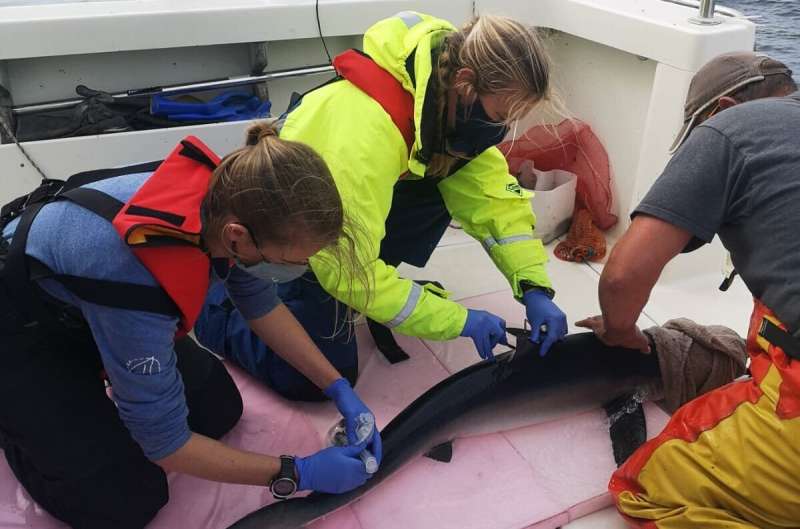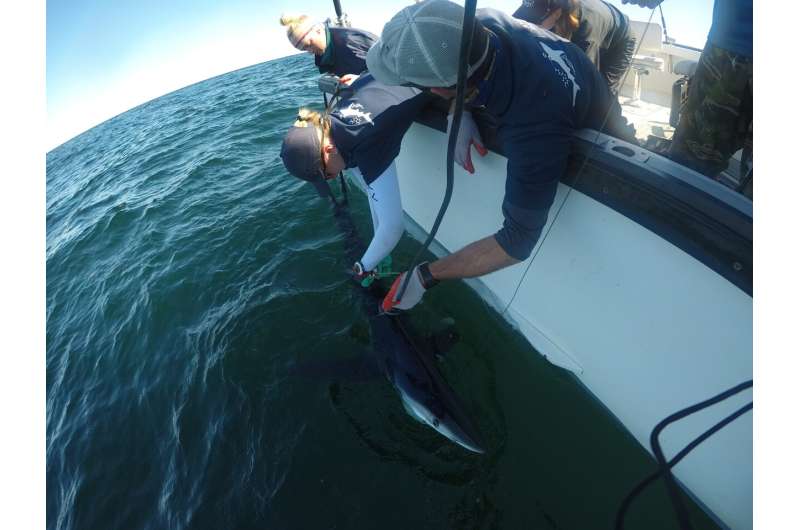Lucy Harding and Dr. Nick Payne work with their staff from Beneath the Waves to tag a three-meter tiger shark in the Bahamas in May 2019. Credit: Diego Camejo.
New research by ice scientists suggests that sharks caught and released by recreational fishermen may be of concern. The team found that the ocean’s iconic predators typically experience a dramatic rise in temperature after being caught, which can have physiological and behavioral consequences.
Hobby fishermen and scientists often catch sharks off the coast of Ireland and around the world and then return them to the water. However, with catch-and-release fishing practices on the rise, do we know enough about the impact this practice can have on the health and welfare of animals, many of which are critically endangered?
Lucy Harding, PhD candidate at Trinity College Dublin’s School of Life Sciences and her international team of collaborators worked directly with shark fishing operators to assess how catch-and-release fishing might affect shark behavior and physiology in sharks sailing in the Bahamas, off the coast of Cape Cod in the US and in Irish waters around the co.
The team caught the sharks with a rod and reel (a baited hook) and, without harming the animals, inserted thermometers into their muscles to see if their body temperatures changed. They also attached bio-recording devices to the sharks’ fins, which recorded things like body temperature and water temperature when they were released back into the wild.

Trinity’s Lucy Harding and Jenny Bortaluzzi work to insert a temperature probe into a 2m blue shark caught off the coast of Cork, Ireland in August 2021. Credit: Hayley Dalton.
Lucy, who is the first author of a related research paper that has just been published in the journal Physiology of conservationsays that “the temperature measurements we made show that angling sharks with a line caused rapid spikes in their body temperature, with one blue shark showing a rise of 2.7°C in just a few minutes, which is physiologically equivalent to a huge height appears.”
Because the sharks in this study (the blue shark, Prionace glauca and the tiger shark, Galeocerdo cuvier) are considered “cold-blooded,” their body temperatures tend to match whatever water temperature they’re swimming in. Therefore, it is unusual to see such an elevation.
The team also found that it took the sharks up to 40 minutes to cool down after being released back into the water.
Nick Payne, associate professor in Trinity’s School of Life Sciences, says, “These results illustrate the physical stress sharks are exposed to during catch-and-release fishing. We don’t yet know whether the rapid heating caused by fishing has a detrimental effect on shark physiology, but this is something that is important to study in more detail in the future.”

Lucy Harding and her staff at Beneath the Waves work to attach a biological recording device to the fin of a blue shark on Cape Cod in September 2019. Credit: Hana Ishihara.
These are large, rapid increases in the body temperature appear abnormal in the context of what these animals experience naturally, and the authors hope their data can help guide management.
Dr Payne added that “the results of this research can be used to develop better shark fishing methods in the future; if we can adopt the least stressful fishing methods, then it is a win for sharks and for future generations of anglers.”
Lucy Harding and others, Capture heats up shark, Physiology of conservation (2022). DOI: 10.1093/conphys/coac065
Provided
Trinity College Dublin
Citation: Catch and Release Fishing May Cause Temperature Spikes in Sharks (2022, October 5) Retrieved October 5, 2022, from https://phys.org/news/2022-10-catch-and-release-fishing- temperature-spikes- sharks.html
This document is subject to copyright. Except in good faith for the purpose of private study or research, no part may be reproduced without written permission. The content is provided for informational purposes only.






